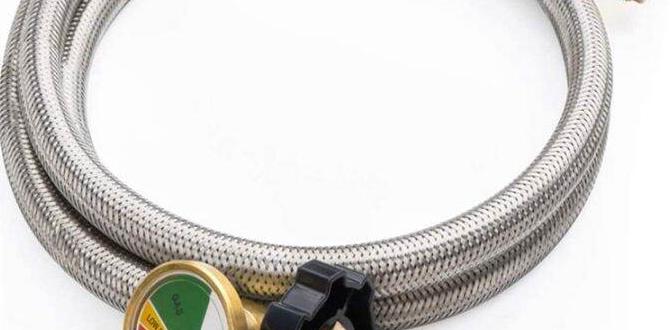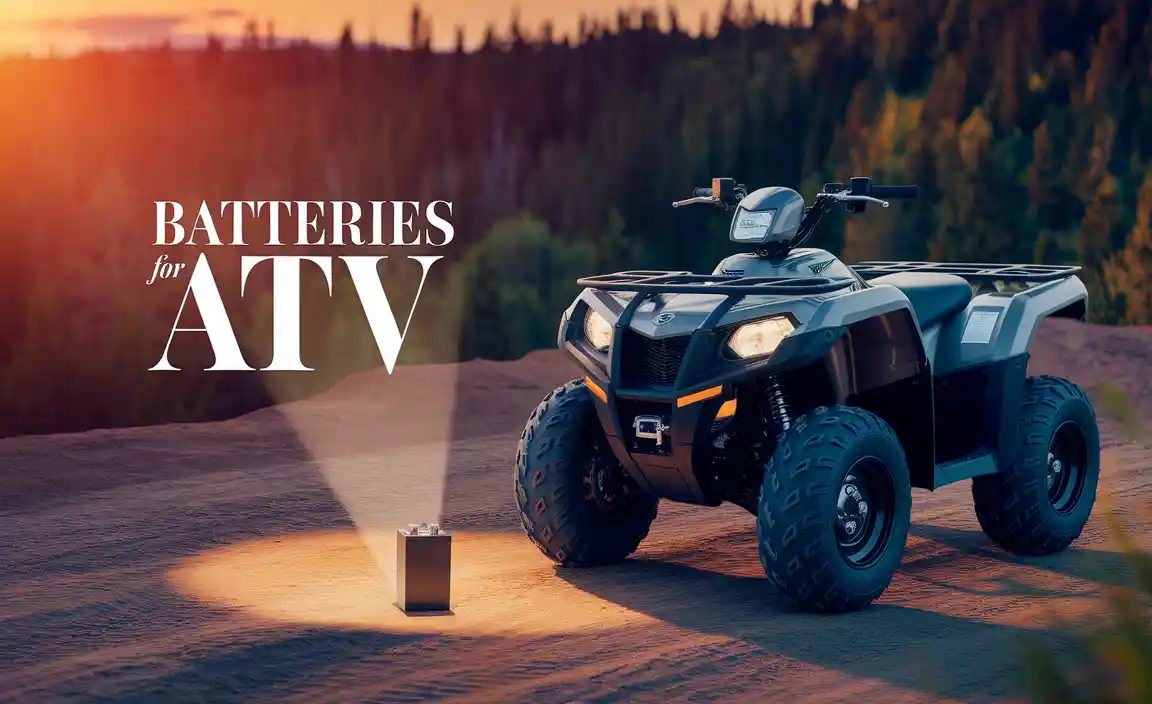Finding a cheap EV battery for trucks is possible! This guide breaks down affordable options and essential tips for truck owners looking to switch to electric without breaking the bank. We’ll cover smart choices and essential knowledge to make your EV truck battery purchase a success.
Affordable EV Batteries for Trucks: Your Essential Guide
Thinking about an electric truck but worried about the battery cost? You’re not alone! The battery is often the biggest piece of the EV puzzle. But good news – getting a capable and affordable EV battery for your truck is more achievable than you might think. We’re here to help you navigate the options and make smart choices. Let’s get your truck powered up the electric way, without emptying your wallet.
This guide will walk you through everything you need to know. We’ll explore how to find value, what to look for, and the essential factors that make a battery “cheap” but still reliable. Get ready to discover the world of budget-friendly electric trucking!
Understanding EV Truck Batteries: What You Need to Know
When we talk about an EV truck battery, we’re really talking about a large pack of lithium-ion cells working together. These batteries provide the power to move your truck, store energy from charging, and are crucial for the vehicle’s total range. The cost of these batteries is a major factor in the overall price of an electric truck.
For trucks, these battery packs need to be robust. They have to handle more demanding tasks, potentially more frequent charging, and the general wear and tear of truck usage. This means they’re typically larger and more powerful than car batteries, which can translate to higher initial costs.
Key Battery Components for Trucks
- Battery Management System (BMS): This is the brain of the battery. It monitors and controls things like charging, discharging, temperature, and the health of individual cells. A good BMS is vital for safety and longevity.
- Battery Cells: These are the individual building blocks of the battery pack. Different chemistries (like NMC or LFP) have different costs, energy densities, and lifespans.
- Pack Casing: This is the protective shell that holds all the cells and the BMS together. It needs to be strong and often sealed to protect from water and impacts.
- Cooling System: Truck batteries generate a lot of heat. A liquid or air cooling system is essential to keep the battery at optimal temperatures for performance and longevity.
The “Cheap” Factor: What Does It Really Mean for EV Truck Batteries?
When you’re looking for a “cheap EV battery for trucks,” it’s important to understand that this typically doesn’t mean low quality. Instead, it often refers to:
- Refurbished or Remanufactured Batteries: These are used battery packs that have been tested, repaired, and restored to a certain level of performance and safety. They offer a significant cost saving over new batteries.
- Aftermarket Batteries: Companies other than the original truck manufacturer might offer compatible battery packs. These can sometimes be more competitively priced.
- Previous Generation Technology: Older battery chemistries or designs might be less cutting-edge but are generally more affordable. For many uses, they are still perfectly adequate.
- Lower Capacity Options: If you don’t need the absolute longest range, opting for a smaller battery pack can reduce overall cost. This is like choosing a phone with less storage if you don’t need much.
It’s crucial to balance cost with other factors like warranty, expected lifespan, and performance. A battery that’s too cheap might end up costing more in the long run due to frequent repairs or premature failure.
Proven Options for Affordable EV Truck Batteries
Finding reliable and affordable EV truck batteries requires a bit of research. Here are some avenues and considerations for truck owners:
1. Remanufactured and Refurbished Battery Packs
Salvaging and rebuilding existing battery packs is one of the most common ways to get a cheaper EV battery for trucks. Companies specializing in battery recycling and remanufacturing can test, replace faulty modules, and reassemble packs to a good working standard.
- Pros: Significant cost savings, reduces waste by giving old batteries a new life.
- Cons: Lifespan might be shorter than new, warranty can be limited, performance might not be at peak.
- Where to Look: Specialized EV battery repair and recycling companies (often found through online searches for “EV battery remanufacturing” or “used EV battery packs”).
It’s vital to choose a reputable company with clear testing procedures and a decent warranty. Ask about the specific cells used, the testing process, and what kind of guarantee they offer. For example, some companies may recondition battery modules that are showing signs of degradation, offering a second life for these expensive components. Check out resources from organizations like the U.S. Department of Energy’s Alternative Fuels Data Center for general information on EV charging and infrastructure, which indirectly impacts battery considerations.
2. Aftermarket Battery Manufacturers
Beyond the original equipment manufacturer (OEM), there are third-party companies that develop and sell EV batteries. These can be for new installations or as replacements for existing trucks.
- Pros: Potentially lower prices than OEM, sometimes offer battery upgrades or custom solutions.
- Cons: Quality can vary widely, compatibility needs careful checking, warranty terms are critical.
- Where to Look: Companies specializing in EV conversions or aftermarket battery solutions for specific truck models. A quick search for “[Your Truck Model] aftermarket EV battery” might yield results.
When exploring aftermarket options, always look for certifications and independent reviews. Companies like Tesla, for instance, don’t typically sell their batteries directly for aftermarket use in other truck brands, but their pioneering work in battery tech influences the whole market. For trucks, specific aftermarket solutions might come from companies focusing on commercial vehicles or EV conversions.
3. Choosing Lower Capacity for Cost Savings
Not every truck owner needs an ultra-long-range solution. If your typical driving is within a certain radius, a battery with a smaller capacity (kWh) will be cheaper. This is a direct trade-off: less range for less money.
- Pros: Lower upfront purchase price, potentially lighter battery pack.
- Cons: Reduced driving range, might not be suitable for heavy-duty towing or long hauls.
- How to Decide: Map out your daily routes and typical driving needs. Consider how often you’d need to charge with a smaller battery.
For example, if your truck is mainly used for local deliveries or commuting, a 60 kWh battery might be sufficient and much cheaper than an 80 kWh or 100 kWh pack offered in higher trims. This is similar to how a smaller adapter or a lower-capacity power bank is cheaper than their larger counterparts.
Essential Factors to Consider When Buying a Cheap EV Truck Battery
When you’re eyeing a “cheap EV battery for trucks,” don’t let the price be the only deciding factor. Here’s what else matters:
Warranty is Key
A warranty is your insurance policy against a bad purchase. Even with cheaper options, a decent warranty provides peace of mind. Look for:
- Duration: How many years or miles is it covered?
- Coverage: What specific parts or issues are covered (e.g., total failure, capacity degradation)?
- Pro-rata vs. Full Replacement: Understand if the warranty offers a full replacement or a prorated value based on age or usage.
Most new EV batteries come with a substantial warranty (often 8 years or 100,000 miles). For refurbished or aftermarket batteries, warranties might be shorter, perhaps 1-3 years. A reputable seller will have a clear and fair warranty policy.
Battery Health (State of Health – SOH)
For used or refurbished batteries, the State of Health (SOH) is crucial. SOH indicates how much capacity the battery still has compared to when it was new. A battery with 100% SOH is like new, while 70% SOH means it can only hold 70% of its original charge.
- What to Aim For: For a cost-effective but usable battery, aim for a SOH of at least 80% or higher.
- How to Check: Ask the seller for diagnostic reports. Reputable shops will provide this information.
Understanding SOH helps manage expectations regarding range and overall lifespan. A battery with 90% SOH will offer significantly better range than one at 60% SOH, even if both are considered “used.”
Battery Chemistry and Technology
EV batteries use different chemistries. Lithium Iron Phosphate (LFP) batteries are generally cheaper, safer, and have a longer cycle life (meaning they can be charged and discharged many more times) than Nickel Manganese Cobalt (NMC) batteries. However, NMC batteries typically offer higher energy density, meaning more range for the same weight.
LFP (Lithium Iron Phosphate):
- Pros: Lower cost, longer lifespan (more charge cycles), safer (less prone to thermal runaway).
- Cons: Lower energy density (can lead to slightly less range for the same size/weight compared to NMC).
NMC (Nickel Manganese Cobalt):
- Pros: Higher energy density (more range).
- Cons: Higher cost, shorter lifespan (fewer charge cycles), safety concerns (though significantly mitigated by BMS).
For a “cheap” option, LFP chemistry is often a good starting point, especially if daily range needs aren’t extreme and longevity is prioritized.
Charging Speed Capabilities
Cheap doesn’t have to mean slow charging. Batteries are designed to accept power at certain rates. While a pack might be affordable, ensure it can still charge at a speed that suits your lifestyle.
- AC Charging: Slower charging from home or public Level 2 stations.
- DC Fast Charging: Faster charging from DC fast chargers, crucial for road trips.
Check the battery pack’s specifications for its maximum DC fast charging rate. A slower charging battery might be cheaper but could cause significant inconvenience if you rely on quick top-ups.
Safety First: When Buying and Using Batteries
Safety is paramount when dealing with high-voltage battery systems, especially for trucks which have large capacities.
Professional Installation is Recommended
Attempting to install an EV battery pack yourself is generally not recommended for beginners. These systems are complex, high-voltage, and require specialized tools and knowledge.
- Risks of DIY Installation: Electric shock, damage to the battery pack, damage to the vehicle, voiding any warranty.
- Benefits of Professional Installation: Ensures the battery is installed correctly and safely, often includes testing and calibration, and can come with a labor warranty.
Seek out certified EV technicians or shops experienced with battery installations. They will know how to handle the high-voltage connections, disconnects, and ensure the Battery Management System (BMS) is functioning perfectly with your truck’s systems.
Inspecting a Used Battery Pack
If you’re buying a used or refurbished battery, visual inspection is your first line of defense.
- Look for: Physical damage (dents, cracks), corrosion on terminals, signs of leakage, any unusual smells.
- Ask for: Diagnostic reports, recent testing data showing SOH and cell voltage balance.
Reputable sellers will be transparent about a battery’s history and condition. Be wary of those who are evasive or unwilling to provide detailed information.
Understanding Thermal Management
EV batteries need to stay within a specific temperature range to operate efficiently and safely. Trucks, often working harder, place greater demands on their battery cooling systems.
- Liquid Cooling: Most modern EV truck batteries use a liquid cooling system (like specialized coolant circulating through channels in the battery pack).
- Air Cooling: Some older or smaller systems might use forced air, but this is less common for trucks.
Ensure the battery you’re considering and your truck’s vehicle system are compatible with the same thermal management strategy. Issues here can severely shorten battery life or even lead to dangerous situations.
Cost Comparison: New vs. Remanufactured EV Truck Batteries
The price difference between a brand-new, OEM battery and a remanufactured one can be substantial. This table gives a general idea, but actual prices will vary greatly based on truck model, battery size, and the supplier.
| Battery Type | Typical Price Range (USD) | Pros | Cons |
|---|---|---|---|
| Brand New OEM Battery | $10,000 – $25,000+ | Full warranty, highest performance, latest technology, longest lifespan. | Most expensive option, limited availability for aftermarket. |
| Remanufactured/Refurbished Battery | $4,000 – $12,000 | Significant cost savings, eco-friendlier by reusing components. | Shorter lifespan than new, limited warranty, performance may be slightly reduced. |
| Aftermarket New Battery (Non-OEM) | $7,000 – $18,000 | Potentially cheaper than OEM, may offer specific features or upgrades. | Quality varies, compatibility needs strict checking, warranty terms essential. |
As you can see, a remanufactured battery offers the most accessible “cheap” option for an EV truck battery. However, it’s crucial to factor in the potential trade-offs in lifespan and warranty coverage compared to a new battery.
Real-World Example: A Truck Owner’s Experience
Meet “Sam,” a small business owner who uses his electric pickup truck for local deliveries. His original battery had started losing significant range, impacting his business. A new OEM replacement was quoted at $18,000, which was too steep for his budget.
Sam researched and found a company specializing in refurbished Tesla battery packs for conversion vehicles. They had a pack from a scrapped Model S that had been thoroughly tested and rebuilt with healthy modules. This remanufactured pack offered about 85% of its original capacity and came with a 2-year warranty.
The cost for Sam’s remanufactured battery, fully installed by a certified EV shop, was $7,500. While he lost some range compared to his truck’s original battery, it was still sufficient for his daily routes. The savings were substantial, allowing him to continue using his electric truck profitably.
Sam’s story highlights that with careful research, a “cheap EV battery for trucks” can be a practical and financially sound solution, extending the life of your vehicle without a massive new investment.
Are There Government Incentives for EV Battery Replacements?
Incentives for electric vehicles are primarily focused on the purchase of new EVs. However, there might be some localized or regional programs that could help with EV infrastructure or retrofits. It’s always worth investigating:
- Federal Tax Credits: Often for new EV purchases, but historically, there have been credits for components in some cases. Check the IRS website or consult a tax professional for current details.
- State and Local Programs: Many states or cities offer rebates or incentives for EV purchases or charging equipment. Some might extend to commercial vehicles or fleet upgrades. Search for “[Your State/City] EV incentives.”
- Utility Company Programs: Some electric utility companies offer rebates for EV charging equipment or specific EV fleet programs.
While direct incentives for buying a used or cheaper battery are rare, any available incentive can further reduce the overall cost of transitioning or maintaining your electric truck.
Maintenance for Your Truck’s Battery
Once you have an affordable battery installed, proper maintenance is key to making it last as long as possible.
Charging Habits Matter
- Avoid Constant Deep Discharges: Try not to let the battery fall below 20% charge regularly.
- Avoid Constant Full Charges: For daily use, charging to 80-90% is often better for long-term battery health than always charging to 100%.
- Use the Right Charger: Ensure your charger (home or public) is compatible with your battery pack and truck.
Just like you wouldn’t constantly drain your phone battery to 0% and charge it to 100% every single time for optimal lifespan, the same principles apply to EV truck batteries, albeit on a much larger




